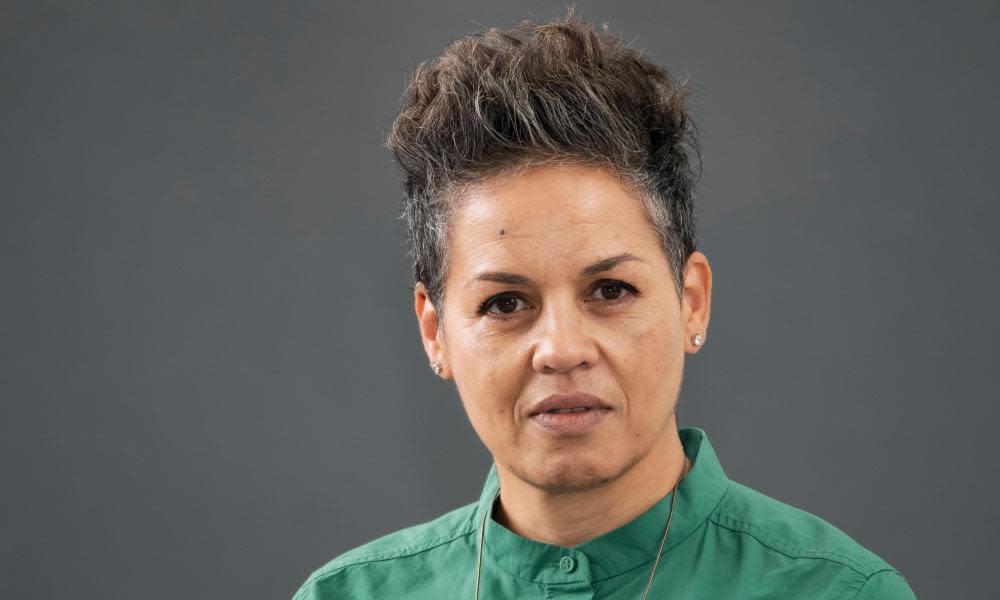Without Warning & Only Sometimes by Kit de Waal review – the making of a writer

When Kit de Waal was growing up, she and her siblings would notice their mother, Sheila, collecting milk bottles. Out of the three that were delivered daily, she would put two empties on the doorstep for the milkman and the third in an old laundry basket. On a Saturday, after their father, Arthur, had left for work, Sheila would take the basket of bottles into the back yard, pick them up one at a time and throw them with all her might against the outhouse wall. “It makes a kind of music, the bottles and the sound of her fury,” writes De Waal. “When the basket is empty, she goes inside and fetches the broom. She’s fine then for a few days.”
De Waal is a remarkable observer and her skill lies in elevating the everyday
In Without Warning & Only Sometimes, De Waal – born Mandy O’Loughlin – recalls her 1960s childhood in the Birmingham suburbs as one of five children of an Irish mother and a West Indian father. Arthur was a bus driver while Sheila worked variously as a childminder, cleaner and auxiliary nurse. Despite the family’s financial struggles – the children would often go to bed hungry – Arthur would intermittently blow his earnings on a pair of Chelsea boots or a fancy suit. When not indulging his sartorial cravings, he would put aside his wages claiming he was saving to buy a house in his beloved St Kitts. “I mean, what kind of fool helps her husband buy a house in another country?” Sheila would rant to her children. “What idiot would help him make a life for himself somewhere else? Me, that’s who.”
The working-class upbringing depicted is entirely of its time: children shoved outdoors from breakfast until teatime in the holidays; women in cat-eye specs and hair nets; men returning from work to find dinner on the table; teachers calling their mixed-race pupils names like “Little Miss Fuzzy-Wuzzy” without repercussion. De Waal’s account is clear-eyed and unsentimental, and there is poignancy in what is left unsaid.
Sheila’s discontent led her to find comfort and enlightenment with the Jehovah’s Witnesses. She would drag her reluctant children to meetings where they would be tutored in the sanctity of blood and the evils of the Catholic church. De Waal’s child’s-eye descriptions of church meetings are deliciously evocative: “Time does not pass. The clock does not move … I live with the dread that one day when my young muscles rebel, can take no more stillness and the brutal confinement of my very self, I will stand and strip naked and burst out of my skin. Not today, please not today.”
Related: Kit de Waal: ‘As soon as you introduce a talking horse, I’m just not interested’
De Waal is a remarkable observer and her skill lies in elevating the everyday. Hers is a rich portrait of unremarkable lives. An inveterate daydreamer, she recalls the delight of sitting on her front garden wall watching the goings-on on their road, which were “like a film sometimes, a very slow film without any guns or fights”. Family members, friends and neighbours make colourful character studies. Her maternal grandmother who is tiny “with a quickness about her, a throaty laugh and a vinegar tongue” is particularly vivid. Watching Sheila’s interactions with her mother, De Waal observes “a push-me-pull-you dance, old as time, the child who was never the favourite, the mother who couldn’t love enough. They lock in with clumsy footsteps, out of step with the music, each one trying to lead, stepping on toes.” The rough-and-tumble of childhood is also headily evoked, turning bloody during a game that involved jumping from one piece of bedroom furniture to the next. De Waal hit the bedstead with her chin and bit her tongue so hard she had to have six stitches. Her subsequent lisping pronunciation of the word “kiss” earned her the lifelong nickname, Kit.
De Waal’s memoir takes her up to early adulthood when, after a bout of depression, she gets a job as a clerk at the office of the chief crown prosecutor. When she tells her boss she is struggling to sleep, he suggests she reads to counteract the swirling 4am thoughts, and gives her a list of his favourite books. In doing so, he sparks in De Waal a love of literature, and, with it, a new life begins.
• Without Warning & Only Sometimes by Kit de Waal is published by Tinder (£16.99). To support the Guardian and Observer order your copy at guardianbookshop.com. Delivery charges may apply.

 Yahoo Movies
Yahoo Movies 
